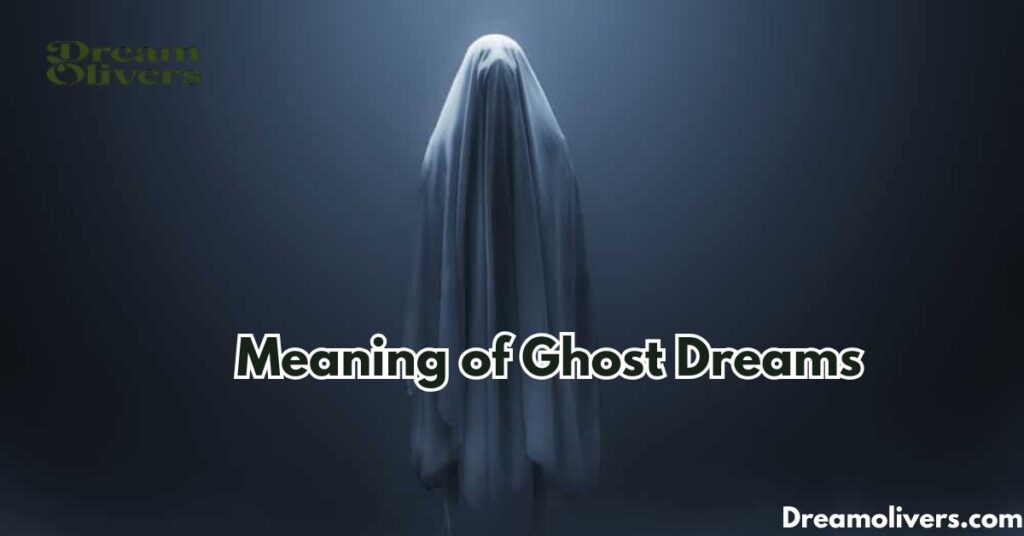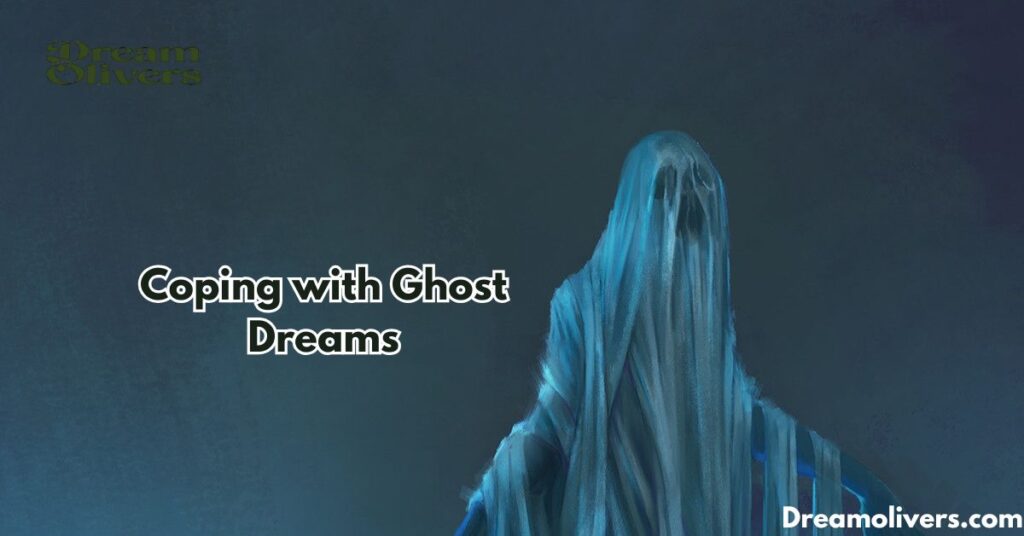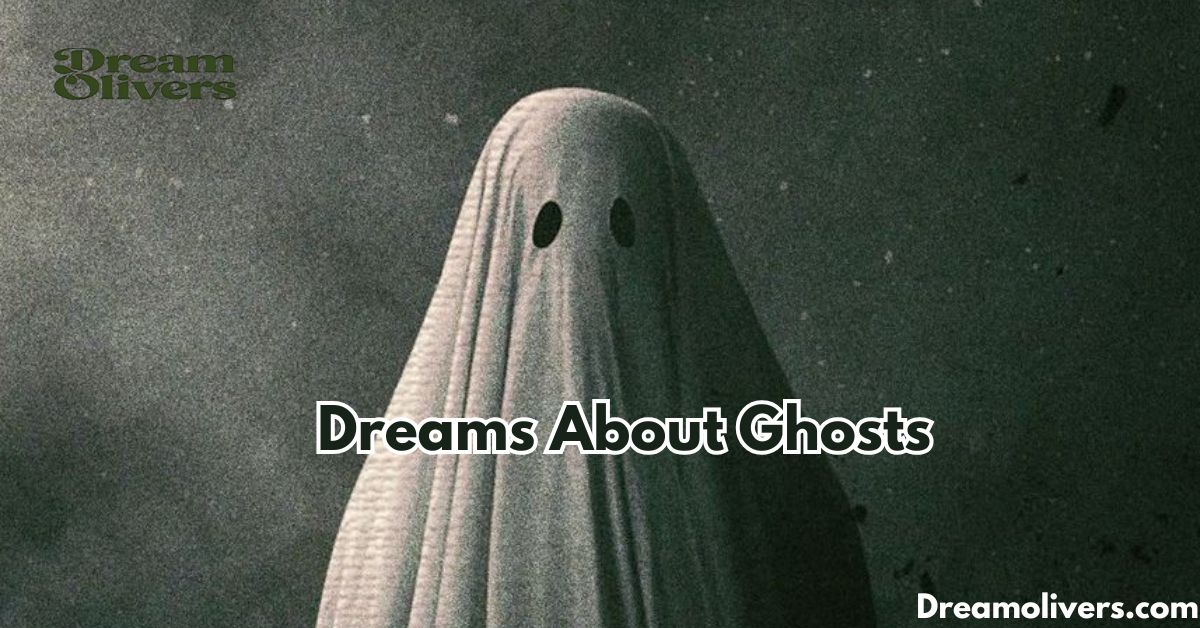Dreams about ghosts are some of the most chilling and perplexing experiences in the world of dreams. Whether they feature deceased loved ones, unsettling encounters with spectral beings, or haunting imagery, these dreams about ghosts often stir up intense emotions and provoke deep reflection. But what exactly do ghost dreams mean? Why do they appear, and what messages do they carry from the depths of our subconscious minds?
In this article, we will delve into the intricate symbolism of dreams, specifically focusing on ghost dreams. We’ll explore their psychological interpretations, their potential spiritual significance, and the common themes that emerge from these haunting experiences. Through this exploration, we aim to provide a clearer understanding of what ghost dreams can reveal about our emotional state, unresolved issues, and connections to the spiritual world.
Defining Ghost Dreams: What Are They?
Before we can begin to interpret ghost dreams, it’s essential to first understand what they are. At their core, ghost dreams involve encountering a spectral being, such as a ghost, apparition, or a spirit. These dreams can range from eerie, frightening experiences to deeply emotional reunions with the spirits of deceased loved ones.
There are several different types of ghost dreams that people commonly experience:
Dreams of Haunting or Being Chased by Ghosts
One of the most common types of ghost dreams involves being haunted or chased by a ghost. These types of dreams often occur when the dreamer is experiencing anxiety, fear, or unresolved emotional issues.
The ghost in these dreams is symbolic of the psychological fears that are “chasing” the dreamer in their waking life. It might be a fear of the unknown, unresolved trauma, or feelings of insecurity.
Encounters with Deceased Loved Ones
Another prevalent form of ghost dreams is encountering the spirits of deceased loved ones. These dreams are often deeply emotional and can leave the dreamer feeling comforted or deeply unsettled.
The ghost may communicate with the dreamer, offering messages of love, closure, or guidance. These dreams are especially common for people who are still grieving the loss of a loved one or who have unresolved feelings related to that loss.
Ghosts in Familiar Locations
Sometimes, ghosts appear in places that are deeply familiar to the dreamer, such as their home, childhood home, or a place that holds significant personal memories.
These dreams might symbolize unresolved issues related to identity, belonging, or security. For example, a ghost in your childhood home could be a manifestation of unresolved issues related to your upbringing or past relationships.
Common Themes in Ghost Dreams
When it comes to understanding ghost dreams, it’s helpful to recognize recurring themes and patterns. These common themes can offer clues about what the ghosts in your dreams represent and what messages they might be trying to communicate. Let’s break down some of the most frequently reported themes in ghost dreams:
Dreams of Haunting or Chased by Ghosts
In these types of dreams, the dreamer is often pursued by a ghost or spiritual being that causes a sense of panic or fear. This is one of the most unsettling types of ghost dreams, and it typically symbolizes that the dreamer is being haunted by unresolved fears, trauma, or emotional baggage.
The ghost in these dreams is not always malevolent but is a representation of something the dreamer needs to confront in their waking life.
Encounters with Deceased Loved Ones
Dreams of dead loved ones are common, especially after a recent loss or during periods of grief. These dreams often provide comfort and can be seen as a way for the subconscious to process feelings of loss, grief, and unresolved emotions.
Sometimes the deceased person may speak or convey a message to the dreamer, providing a sense of closure or offering wisdom that can help the dreamer navigate their emotional journey.
Ghosts in Familiar Locations
In these types of ghost dreams, the ghost often appears in a place that is familiar to the dreamer such as their home or a past childhood residence. These dreams can symbolize the dreamer’s need to reconcile with their past or revisit unresolved issues tied to their identity and personal history.
The appearance of a ghost in familiar spaces may also point to feelings of insecurity or vulnerability in the dreamer’s waking life, suggesting the need for a deeper understanding of one’s self and the challenges they face.
Interacting with the Ghost: Messages and Communication
In some ghost dreams, the dreamer may actually interact with the ghost in some way. The ghost might speak, convey messages, or even appear friendly. This type of interaction could symbolize the dreamer’s subconscious need for communication, whether with their own inner self or with someone from their past. These dreams can be seen as an invitation to engage in self-reflection, healing, or closure.
Ghosts in Mirrors or Reflections
The presence of a ghost in a mirror is another fascinating aspect of ghost dreams. Mirrors are symbolic of self-reflection, so a ghost appearing in a mirror may suggest that the dreamer is grappling with aspects of their identity or self-image.
The ghost may be representing unresolved issues with self-acceptance or aspects of the dreamer’s life that they have been avoiding. In this context, the ghost serves as a mirror to the dreamer’s own inner emotional state, prompting them to confront parts of themselves they may be neglecting.
Unraveling the Meaning of Ghost Dreams: Psychological Interpretations

Understanding the meaning of ghost dreams requires an exploration of both psychological and spiritual perspectives. Let’s first look at how dream psychologists interpret the appearance of ghosts in our dreams.
The Subconscious Mind and Unresolved Emotions
Many psychologists argue that ghost dreams are manifestations of unresolved emotions or trauma from the past. In this view, the ghost is not an external being but a symbol of something within the dreamer that needs to be acknowledged and processed.
If you are experiencing a haunting dream, it might be an indication that there is something in your life that you have not fully confronted perhaps guilt, fear, or grief.
For example, dreaming of a ghost chasing you may reflect a deep-seated fear or anxiety that you have been avoiding. The ghost might symbolize a traumatic event or emotional baggage that continues to “pursue” you, even though you have tried to ignore it.
Fear and Anxiety in Ghost Dreams
Ghost dreams can also reflect underlying fear or anxiety. Fear of death, the unknown, or loss can all manifest in dreams involving ghostly apparitions. In some cases, the ghost may represent the dreamer’s fear of facing difficult situations or emotions that they have been repressing.
For instance, a ghost in a dream might symbolize an anxiety about unresolved issues from the past, such as family conflict, childhood trauma, or unfinished business. These kinds of dreams often encourage the dreamer to face these fears head-on, in order to achieve emotional healing.
The Spiritual Significance of Ghost Dreams
Ghost dreams aren’t solely tied to psychological or emotional issues. For many, these dreams hold spiritual significance. Different cultures and belief systems interpret ghost dreams in various ways, often seeing them as messages from the spiritual realm. But what exactly do these spiritual interpretations suggest?
Ghost Dreams as Messages from the Afterlife
One of the most common spiritual interpretations of ghost dreams is the idea that they are messages from the afterlife. The ghost may represent the spirit of a deceased loved one trying to communicate with the dreamer. These kinds of dreams often occur during times of grief or when the dreamer feels the need for closure.
In some cases, the spirit might convey comforting messages, providing reassurance or guidance. Alternatively, the dream might involve a more intense interaction, where the deceased offers advice or wisdom to help the dreamer navigate their current struggles. Some believe that these ghost dreams occur to help the dreamer come to terms with unresolved grief or regret.
Reconnection with the Past
Another spiritual perspective on ghost dreams is that they serve as a form of reconnection with the past. The ghost may not be a deceased person at all, but rather a symbolic figure representing past relationships, experiences, or stages in life. In this sense, the ghost may offer the dreamer an opportunity to reflect on the past and reconcile unresolved emotions or conflicts.
If you dream of a ghost from your past, it could be an indication that you need to revisit old memories or patterns to move forward. The spiritual lesson may be one of self-awareness, forgiveness, or letting go.
The Role of the Subconscious in Spiritual Dreams
From a psychological perspective, many ghost dreams are rooted in the subconscious mind, even if they carry spiritual meanings. The subconscious often uses symbols, such as ghosts, to communicate messages that are deeply buried in our psyche.
Whether the ghost represents an emotional wound, a spiritual connection, or unresolved trauma, it’s important to explore both the psychological and spiritual aspects of these dreams.
In this way, the ghost may act as a bridge between the conscious and unconscious mind, helping the dreamer uncover deeper layers of their psychological and spiritual self.
The Psychological Effects of Ghost Dreams
Ghost dreams can leave a lasting impact on those who experience them. Whether they are frightening, comforting, or somewhere in between, these dreams can have significant psychological effects on the dreamer. Let’s look at how these types of dreams can affect your mental and emotional well-being.
Anxiety and Stress After Ghost Dreams
Dreams of being chased or haunted by ghosts can evoke strong feelings of fear, anxiety, or stress. In some cases, these emotions can persist even after waking up, leading to increased vigilance or nervousness throughout the day. The subconscious mind may be alerting the dreamer to unresolved fears or emotions that need to be addressed in their waking life.
If the ghost dream is particularly disturbing, it might also lead to sleep disturbances or difficulty relaxing, further exacerbating anxiety. It’s important to address these emotions through strategies like mindfulness, self-reflection, or even therapy if needed.
Emotional Relief and Closure
On the other hand, some ghost dreams can provide a sense of emotional relief. For example, dreams involving deceased loved ones offering messages of comfort or closure can leave the dreamer feeling more at peace with their loss. These dreams might bring about healing or resolution, especially for those struggling with grief or feelings of unfinished business.
If you experience a ghost dream that brings comfort or understanding, it might be worth reflecting on how you can integrate these feelings of closure into your waking life. Sometimes, these dreams encourage us to forgive, accept, or move on from past wounds.
The Need for Emotional Healing
When dreams involve ghosts that represent emotional wounds, these dreams may indicate a need for emotional healing. A recurring ghost dream may suggest that there are unresolved issues from the past that continue to affect the dreamer’s emotional well-being. If these issues are not addressed, they could manifest as recurring nightmares or anxiety in both dreams and waking life.
For example, a ghost in a dream might represent guilt, fear, or repressed emotions that need to be confronted. The dreamer might need to take steps toward emotional growth by seeking therapy, practicing self-compassion, or engaging in self-care techniques that address these wounds.
Coping with Ghost Dreams: Practical Strategies

Whether your ghost dreams are haunting, comforting, or emotionally complex, it’s important to find ways to cope with them. Here are some effective strategies to help you process ghost dreams and understand their deeper meanings.
1. Journaling and Self-Reflection
One of the most helpful techniques for processing ghost dreams is journaling. Writing down your dreams as soon as you wake up can help you capture the vivid details and emotions involved. By reflecting on the symbolism of the dream, you can begin to identify any patterns or themes that may offer insight into your emotional or psychological state.
Consider asking yourself questions like:
- What emotions did I feel during the dream?
- What messages might the ghost be conveying?
- Are there unresolved issues or fears that this dream is highlighting?
2. Meditation and Mindfulness
Engaging in meditation and mindfulness practices can help you process the emotions brought up by ghost dreams. By cultivating a state of awareness and presence, you can begin to confront the emotional baggage or unresolved issues that may be manifesting in your dreams.
Consider setting aside time each day to sit in silence, focusing on your breath and becoming more attuned to your subconscious mind. This practice can help you gain clarity about the symbolism of your dreams and bring emotional healing.
3. Seeking Therapy or Professional Support
For those experiencing particularly intense or distressing ghost dreams, it may be beneficial to seek professional help. A therapist or counselor can assist you in uncovering the psychological roots of these dreams and developing strategies to address the underlying issues. This support can be especially important if the ghost dreams are related to trauma, grief, or persistent emotional pain.
4. Practicing Self-Care
Taking care of your physical and emotional well-being can also play a significant role in reducing the frequency or intensity of ghost dreams. Prioritize self-care activities such as:
- Regular exercise
- Healthy eating habits
- Relaxation techniques
- Engaging in hobbies or activities that bring you joy
By nurturing your overall well-being, you may be able to reduce the emotional triggers that contribute to haunting dreams.
5. Using Lucid Dreaming Techniques
If you’re interested in taking control of your ghost dreams, you might explore lucid dreaming techniques. Lucid dreaming allows the dreamer to become aware that they are dreaming while still in the dream, providing the opportunity to alter the course of the dream.
If you find yourself trapped in a haunting dream, lucid dreaming can help you regain control, confront the ghost, and explore the underlying symbolism of the dream in a more empowering way.
Frequently Asked Questions About Ghost Dreams
What do ghost dreams mean?
Ghost dreams often symbolize unresolved emotions, past trauma, or unfinished business from the subconscious mind. They may also represent feelings of fear, anxiety, or a need for closure in waking life.
What does it mean when you dream about ghosts?
Dreaming about ghosts often reflects unresolved emotional issues, past regrets, or unprocessed grief. It can also signify fears or anxieties that need attention or closure in your waking life.
What does it mean when you dream about ghosts?
Dreaming about ghosts can indicate emotional baggage, unresolved past experiences, or lingering fears. It may also suggest a need for closure or healing from past trauma.
What does a ghost symbolize?
A ghost often symbolizes unresolved emotions, past trauma, or aspects of the subconscious that need attention. It can also represent fear, guilt, or a desire for closure with something or someone from the past.
Why do I keep seeing ghosts in my sleep?
Repeatedly seeing ghosts in your sleep may indicate unresolved emotional issues or past trauma that your subconscious is trying to process. It could also reflect ongoing fears, anxieties, or a need for closure in your waking life.
What does it mean to dream about evil spirits?
Dreaming about evil spirits often symbolizes inner conflicts, fear, or negative emotions like guilt and anxiety. It may reflect a struggle with unresolved issues or a sense of being threatened by external pressures in your life.
What does I’m seeing ghosts mean?
Seeing ghosts may suggest you’re grappling with unresolved emotions, past trauma, or lingering fears. It could also be your subconscious mind’s way of processing things left unsaid or undone from the past.
Why do I have a horror dream?
Horror dreams often stem from deep-seated fears, anxieties, or unresolved emotional issues in your waking life. They can also reflect stress or traumatic experiences that your subconscious mind is trying to process.
What does ghostly presence mean?
A ghostly presence often represents unresolved emotions or past trauma that is still affecting you. It can also symbolize feelings of guilt, fear, or the need for closure in certain areas of your life.
What does it mean when you dream of someone who ghosted you?
Dreaming of someone who ghosted you may reflect unresolved feelings, rejection, or a desire for closure. It can also symbolize your subconscious mind processing the emotional impact of their disappearance from your life.
Conclusion: Unlocking the Mysteries of Ghost Dreams
Ghost dreams can be unsettling, insightful, and even healing. Whether they serve as messages from the subconscious, representations of emotional trauma, or spiritual visitations from the past, understanding the deeper meanings behind these dreams is a powerful tool for self-discovery and growth.
By analyzing dream symbolism, paying attention to the emotional and psychological triggers, and exploring various coping mechanisms, you can unlock the mysteries that ghost dreams present and use them as a pathway to emotional healing, closure, and personal growth.
By integrating mindfulness, lucid dreaming, and professional support where necessary, you can gain greater clarity into the subconscious and spiritual messages that your ghost dreams are trying to convey.
>>>Read Also: Dream About Someone Dying: What It Really Means and Its Significance Explained

DreamOlivers, guided by Tina Hudson, is a spiritual space for inner peace and growth. Offering profound insights, it helps you connect with your higher self. Embrace wisdom and inspiration for a balanced, fulfilling life.

